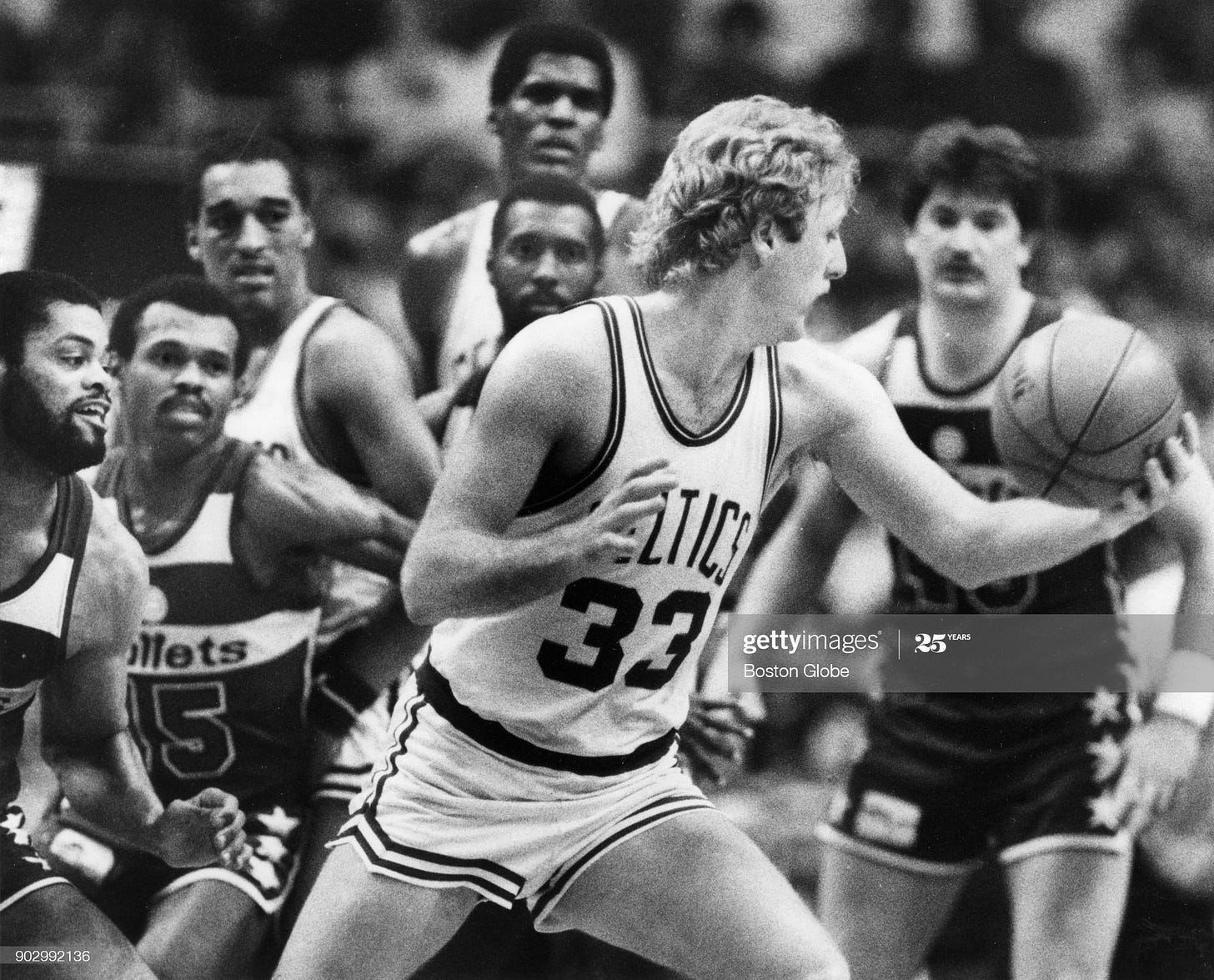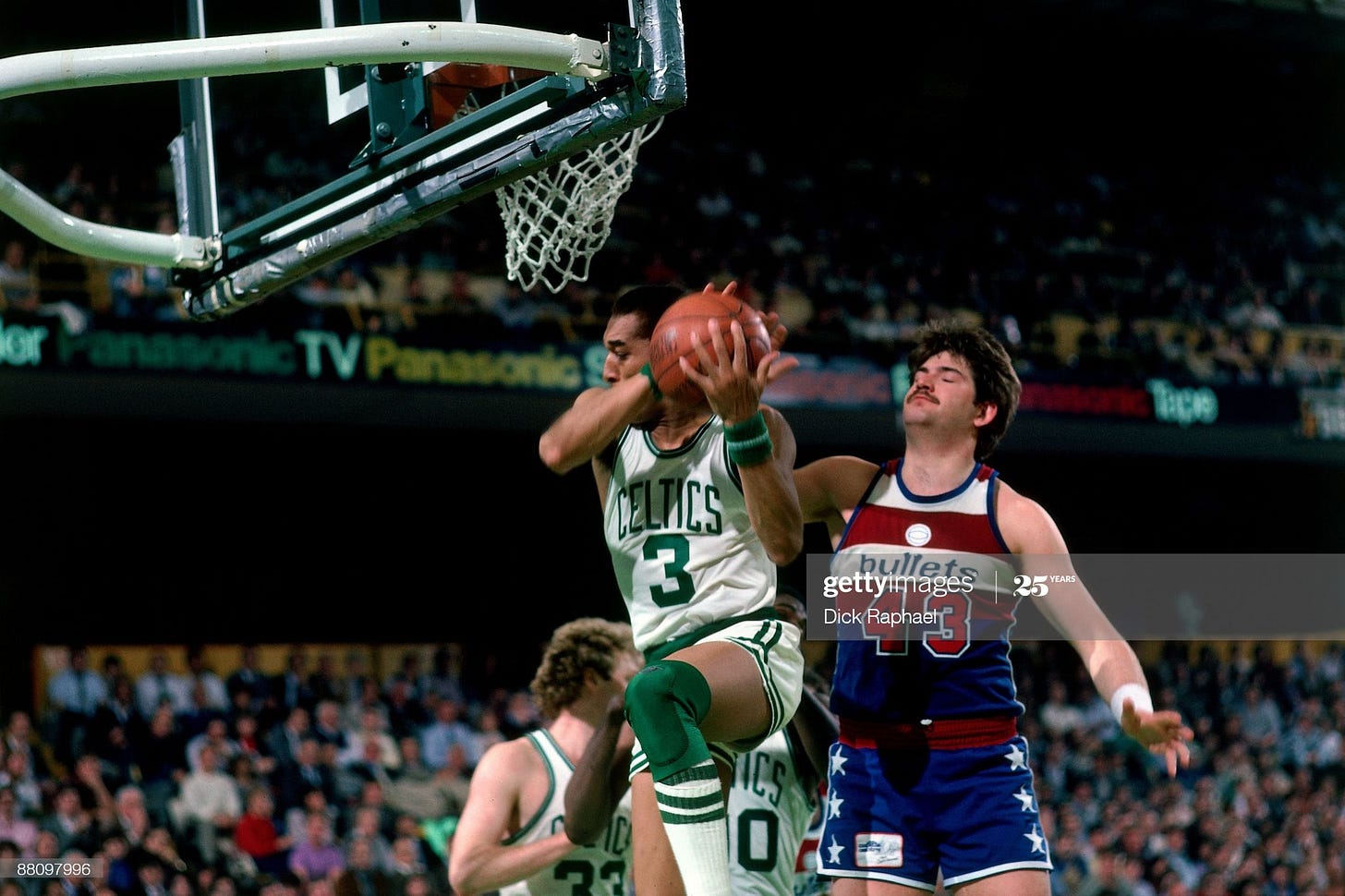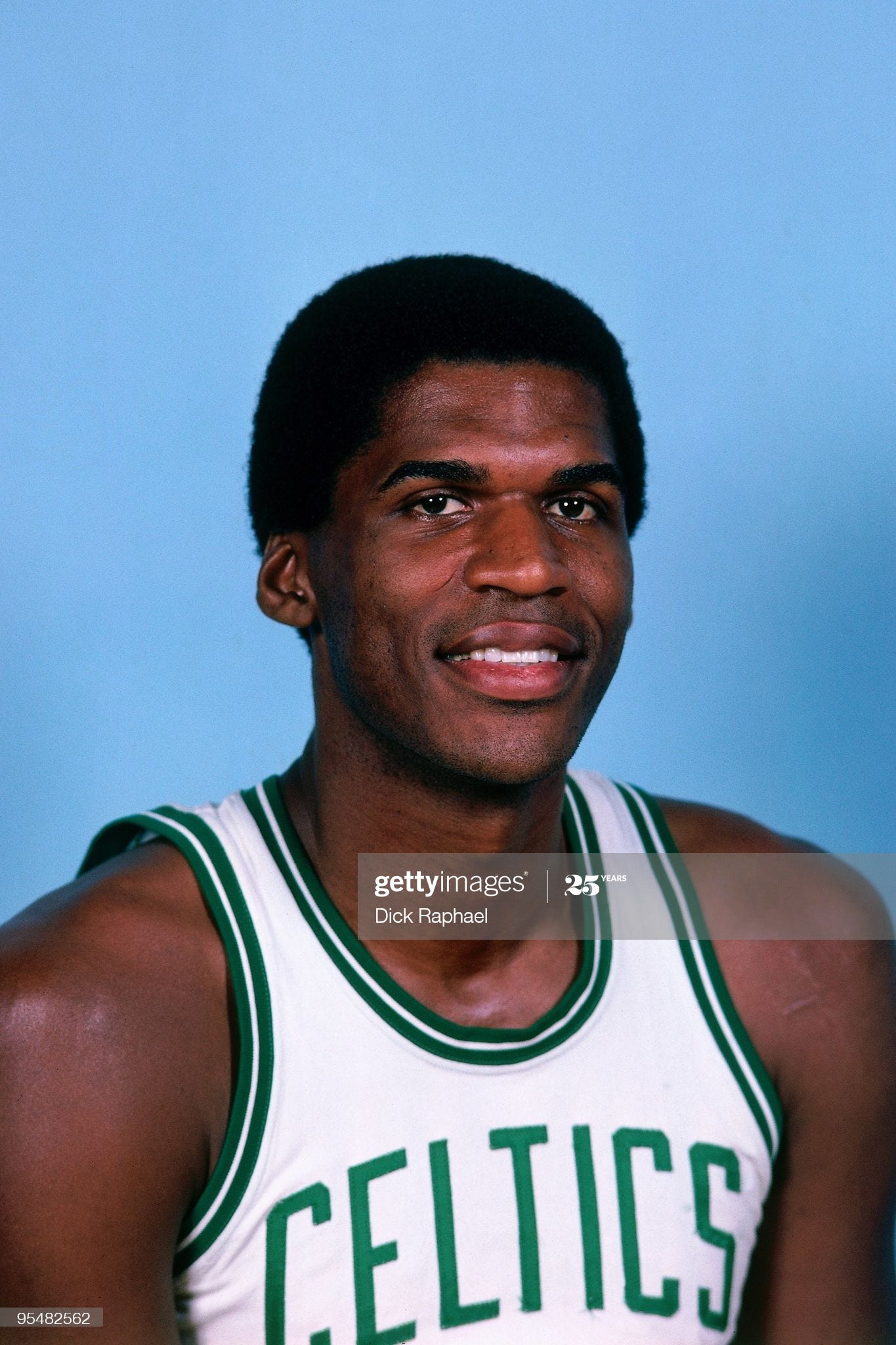Almost Upset: Bullets-Celtics 1984
Support my basketball history coverage and research by subscribing
The 1983-84 NBA season saw the introduction of the “modern” playoff system as the field expanded to eight teams for each conference instead of just six. The biggest impact this had on the postseason was that the regular season division winners no longer received first-round byes.
Also, these first-round series were now best-of-five, which was a nice middle-ground between the too-short best-of-three that was used prior to 1984 and the best-of-seven nonsense we have now.
Hilariously, this expansion of the playoff teams meant that 1984’s top seed in the Eastern Conference got into a bar-room brawl instead of relaxing on the sidelines like they did in previous seasons.
The Boston Celtics ran away with the best record in the NBA in 1984. Their 62 wins were eight ahead of the Los Angeles Lakers’ 54 wins in the West. They blew out the Eastern competition, too, holding a 10-game lead on the second-place Philadelphia 76ers, their Atlantic Division rival.
SIDE NOTE: The 76ers would hilariously lose in the first round of the playoffs to the New Jersey Nets. Despite having the conference’s second-best record, the 76ers got the third seed because #2 was reserved for the 50-win Milwaukee Bucks winners of the Central Division. Therefore Milwaukee got the mediocre 40-win Atlanta Hawks while Philly got the better-than-they-look 45-win Nets.
Anyways, back to Boston!
For their 62-win troubles, the Celtics got the 35-win Washington Bullets. I’ll assume y’all know enough about the Boston Celtics of this era. Bird, McHale, Parish, all that jazz. It is worth mentioning, however, that K.C. Jones was in his first season as head coach of the Celtics replacing Bill Fitch. Also, the thoroughly aged Tiny Archibald was succeeded at point guard by Dennis Johnson, newly acquired from the Phoenix Suns.
As for the Bullets, they need a little more set-up, cuz who the hell is familiar with the 1984 Washington Bullets?
Malaise on the Potomac
During the 1970s, the Bullets were the most consistently successful team in the East averaging 48 wins a season. They made the playoffs every year that decade, were in the NBA Finals four times, and won the title in 1978.
Unfortunately, 1980 hit them like a ton of bricks.
Bob Dandridge broke down that season. Wes Unseld followed suit in 1981. Elvin Hayes was traded prior to the 1982 season. Thus, in quick succession, the Bullets’ Big Three that led them to the 1978 title were all gone. Head coach Dick Motta ditched the club in 1980 to hitch up with the expansion Dallas Mavericks.
Nonetheless, during the 1980s, the Bullets were the most consistently average team in the East as they ho-hummed their way to 40 wins a year. Seriously this was one bland-ass team. They never got more than 43 wins a season, but never cratered either.
The 1983-84 season was their worst of the decade with 35 wins, but with the playoff expansion, they still qualified for the eighth seed. By this point, the team was under the guidance of Gene Shue, who had previously coached them back in their Baltimore days and should be in the Hall of Fame.
Another article for another time…
Washington’s main attraction was the burly Jeff Ruland, who was one of the more incredible players in NBA history. For better or worse, no one had stat lines like Ruland. In his third NBA season, his first as an All-Star, the center averaged 22.2 PPG, 12.3 RPG, 3.9 APG, and .579 FG%. He also committed 4.6 turnovers a night. Ruland was a certified workhorse appearing in 75 games with a league-leading 41.1 minutes a night.
Hmm, Jeff Ruland and Moses Malone. Maybe they should be traded for one another?
(The workload would come back to bite the Bullets and Ruland in the ass. Over the following two years he played in a combined 67 games because of foot injuries that would ultimately end his career).
Ruland’s partners in crime in the frontcourt were Rick Mahorn and Greg Ballard. Mahorn, obviously more famous for his Bad Boy Pistons days, was already a thumper and a bumper in DC. Nine points and nine rebounds a game plus 1.5 BPG for the power forward.
Ballard was the last holdover from the Bullets’ 1978 title team and continued his consummate utility-knife play at small forward. No holes in his game: 14.5 PPG, 6.0 RPG, 3.5 APG, .481 FG%, and .798 FT%.
The backcourt is where things got shaky for the Bullets.
An aging Ricky Sobers started at two guard, while Franky Johnson was the point guard. Both fine players, but not fellas you want in the starting lineup.
The bench was even worse, of course. The only real bright spot was 22-year-old Jeff Malone. The 10th overall pick in the 1983 draft, the rookie averaged just over 12 points a night and would become a breakout scorer the following season.
Nonetheless, they got the eighth seed and got Boston.
OFFICIAL PROHOOPSHISTORY STARTING LINEUP SCOREBOARD
Oh, and the Bullets have no bench as previously discussed, while Boston could bring in McHale plus other quality NBA players.
SERIES PREDICTION: Celtics in a sweep!
GAME 1: BOSTON 91 — WASHINGTON 83
As far as this series goes, Game 1 was a romp for Boston. Bird led the way with 23 points, 12 assists, and seven rebounds. Only shot 9-21, though. For Washington, Ruland was already rumbling. 17 points, 13 rebounds, and 10 assists for the bulldozing center.
Ominously for the Celtics, the Bullets backcourt that I maligned earlier had a pretty sensational game. 24 points on 9-13 shooting for Sobers while Johnson had 12 points and six assists on 5-7 shooting.
This revealed a crack in the Celtics’ armor: Danny Ainge would not play in the series thanks to a sprained ankle he suffered on April 6. Game 1 of this series was just 11 days later on April 17. Now Ainge wasn’t a top-level player, but missing him from the guard platoon could spell trouble, if the other guards faltered…
The other guards faltered.
Scott Wedman shot 1-6 while DJ put up 15 shots making just five of them. So, uh, the Celtics could have used Ainge. But, hey! they survived. Onward and upward!
GAME 2: BOSTON 88 — WASHINGTON 85
Boston escaped this game by the hair of their chinny chin chin.
“This was a game the Bullets could have won,” Leigh Montville of the Boston Globe wrote. It was a game the Bullets absolutely let slip away and the hardest loss of the series. Montville continued:
That was the cruncher. This was a game that they chopped, whittled, pounded into their type of dimensions…. They held the Celtics to one point - one - in the final four minutes and 32 seconds.
“But one point too many,” Jeff Ruland said. “Right?”
Montville kept on, “There are players who play the game with a draw-poker calm and there are players who play with a borderline rage. Jeff Ruland is a rage guy.”
Hmm, checks out.
Ruland let that rage out against the poker-faced Parish as he thumped Boston for 16 points, 10 rebounds, and eight assists. The Chief in contrast had just 11 points on 4-12 shooting.
Meanwhile, Sobers and Johnson combined for 30 points on 13-26 shooting for the Bullets giving them serviceable guard play once more. Ballard had a fantastic utility game: 20 points to lead the Bullets plus nine rebounds, three assists, three steals, and a block.
But, y’know, Boston had Larry Bird.
23 points, 12 boards, and six assists on 10-17 shooting for Larry Legend. They also had Gerald Henderson who was fantastic with 21 points on 10-15 shooting.
So, why was this game so close?
I mean Washington even had one of their starters (Mahorn) in terrible foul trouble, so coach Shue resorted to using Tom McMillen and Joe Kopicki. Now there’s two dudes that the less you see of in the playoffs, the better off you are.
Well, the game was so close because Washington was determined to make Boston’s guards do the work. As Dan Shaughnessy of the Globe described it:
Washington has carried out its game plan perfectly. “They just say, ‘Come hell or high water, Boston’s big people are not going to beat us.’”
Maxwell (7) Parish (11) and McHale (6) combined for 24 points - less than than half of their regular season average (an aggregate 49 points per game). They were all scoreless in the first quarter when the Bullets shot 65 percent and rode a 15-2 surge to a 29-19 lead.
The Bullets had Sobers and Frank Johnson dropping down to help out on Parish and Company…. Celtics observers know that Boston is in for a long night when the guards are scoring most of the points.
Still, Boston got the win.
GAME 3 (OT): WASHINGTON 111 — BOSTON 108
Oh, look, Dennis Johnson came to play! 18 points and seven assists. And he made half of his shots (7-14 FGs)!
Unfortunately for Boston, though, Ruland was now FULLY activated as he destroyed Parish once more for 33 points on 13-22 FGs and 7-8 FTs. The center added in 13 boards (six offensive) and five assists for good measure.
It seems that Ruland took umbrage at Kevin McHale’s earlier declaration in the series that the Bullets couldn’t beat the Celtics. “Go over and tell Maxwell and McHale that we can beat them,” snarled the Bullets center.
Meanwhile the Chief mustered a pathetic 11 points on 4-17 shooting 🤮. He did grab 16 rebounds, but it was a rough night for Parish. And of course Bird was Bird: 27 points, six assists, five boards, four blocks, and two steals.
Washington seemingly had this game in the bag holding a 92-82 lead midway through the fourth quarter. Putting the clamps on Washington, Boston was able to close out regulation on a 16-6 run to send the game into overtime.
The extra frame was a seesaw fight, but the Bullets got the final go-ahead thanks to a lucky-ass shot by Mahorn. With 37 seconds left in the game and the shot clock winding down, the ball found its way to the burly forward who was open, for good reason, from 15 feet out.
Quoted by Mike Madden, Mahorn was humbly arrogant about his shot.
“You know, in college I had no range. I’d shoot when I’d have the shot…. I was just trying to beat the clock but don’t forget, I was squaring up to the basket pretty good. It went swish, didn’t it?”
Indeed, it went swish. Bullets win!
GAME 4: BOSTON 99 — WASHINGTON 96
Despite being up two-games-to-one, Boston easily could have been the club down in the hole. And the Bullets made the final contest another cardiac attack for the Celts.
Bird had a ho-hum game by his standards: 17 points, seven assists, six rebounds, four steals, and two blocks.
Ruland on the other hand continued to pummel away with 30 points, 15 rebounds, and eight assists. This man was a monster!
For Washington, though, this is where the lack of depth came back to haunt them. Four of their starters played between 42 and 46 minutes. Off the bench, Malone was able to provide 19 minutes. The other three bench players combined for 13 minutes. Heavy was the load for a Bullets starter.
For Boston, Bird put in 43 minutes; Parish, McHale, Johnson, and Maxwell each played between 32 and 36 minutes; and Gerald Henderson (27 minutes) and Quinn Buckner (21 minutes) also gave steady, useful minutes.
Boston’s bench power was displayed in the second quarter. A 15-0 run was mostly the result of McHale and Buckner (13 points combined for those two in the sprint). That turned a 34-31 deficit into a 46-34 lead that Boston never gave up for the rest of the game. At one point in the third quarter, the Celtics’ edge ballooned to 62-46.
Also worth mentioning that Parish finally arrived to the series. After three horrific games, the Chief delivered 20 points and 12 rebounds on 8-13 FGs.
Nonetheless, Washington didn’t quit and whittled the third quarter deficit from 16 points down to five by the end of the period.
In the fourth quarter, Boston again built a double-digit lead, 90-80, with 2:44 left in the game. But at that 2:44 mark, Parish fouled out. The Bullets took advantage closing the game on a 16-9 run. The valiant effort obviously fell short and Washington’s upset bid was over.
Parish, who rightfully had been called out for his crummy play in the series had a few words.
“I wanted to have a good game,” Parish said afterwards to the Boston Globe. “I was excited. You might not have known it. Most people might not have known it. But my teammates knew it.”
How? “They could tell during the introductions. I usually sit until my name is called. Tonight I was walking around, standing, I was ready to go.”
An excited Robert Parish…
WRAP IT UP
After the spirited but brief playoff run, the Bullets in the 1984 offseason actually addressed their backcourt issues by acquiring Gus Williams from the Seattle SuperSonics. With the blossoming of Jeff Malone, Washington had a much-improved guard combo.
Unfortunately, Ruland began to have his foot problems and the Bullets finished with 40 wins in the 1984-85 season. They would lose 3-1 to the 76ers in the first round of the playoffs in much less exciting fashion.
As for the Celtics, they would go on to win the NBA title in seven games versus the Los Angeles Lakers in 1984.
To no one’s surprise, they again led the East in wins for the 1984-85 season. Their 63 victories gave them a first-round matchup with the lowly 36-win Cleveland Cavaliers.
Shockingly, Boston found itself in an even harder first-round fight with Cleveland than they had with the Bullets.
That story next time on Almost Upset.







